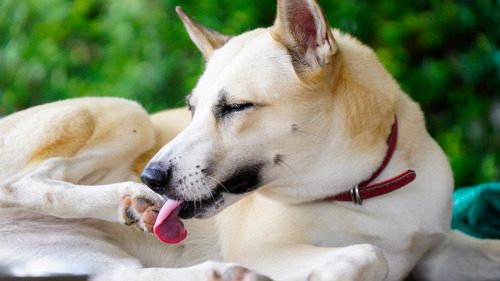
Dogs licking their paws can be a common sight, but when it becomes excessive, it can raise concerns. As a pet owner, understanding why your dog engages in this behavior can help you address the underlying issues and ensure their comfort and health. In this blog, we will explore the reasons behind paw licking, potential health concerns, and when it might be time to consult a veterinarian.
Possible Reasons for Paw Licking
Allergies
One of the most common reasons for a dog licking its paws is allergies. Dogs can be allergic to various environmental factors such as pollen, mold, dust mites, and even certain foods. When a dog has an allergic reaction, their paws may become itchy, causing them to lick in an attempt to soothe the irritation. Allergies can also cause redness, swelling, and other skin issues, which can further increase the frequency of paw licking.
Boredom or Anxiety
Dogs, like humans, can experience boredom and anxiety. When a dog is left alone for long periods or does not receive enough mental and physical stimulation, they may resort to licking their paws as a coping mechanism. This repetitive behavior can provide temporary relief from stress or serve as a distraction from boredom. Signs of anxiety-induced licking can include pacing, whining, and other changes in behavior.
Health Issues Leading to Paw Licking
Infections
Paw licking can sometimes be a symptom of an underlying infection. Bacterial or fungal infections can cause itching, redness, and discomfort in your dog’s paws. These infections can result from an injury, a foreign object lodged in the paw, or prolonged exposure to moisture. If left untreated, infections can worsen and lead to more severe health issues, making it essential to address them promptly.
Bacterial Infections
Bacterial infections can arise from cuts, scrapes, or other injuries that break the skin’s surface. These infections often cause swelling, redness, and pus, which can make the paw extremely uncomfortable for your dog. Persistent licking can exacerbate the issue, so it’s important to seek veterinary advice if you suspect an infection.
Fungal Infections
Fungal infections, such as yeast infections, are another common cause of paw licking. These infections thrive in warm, moist environments, making a dog’s paws an ideal breeding ground. Symptoms include itching, redness, and a distinct odor. Treating fungal infections typically involves topical medications or antifungal shampoos prescribed by your veterinarian.
Parasites
Parasites like fleas, ticks, and mites can also lead to excessive paw licking. These tiny creatures can cause intense itching and irritation, prompting your dog to lick their paws for relief. Flea infestations are particularly notorious for causing allergic reactions, known as flea allergy dermatitis, which can result in relentless itching and licking.
Behavioral Reasons for Paw Licking
Compulsive Behavior
In some cases, paw licking can become a compulsive behavior. Compulsive licking is characterized by repetitive, seemingly purposeless licking that can lead to raw, irritated skin. This behavior often stems from underlying anxiety or stress and may require behavioral modification techniques and professional intervention to address effectively.
Attention-Seeking Behavior
Dogs are highly social animals and can quickly learn that certain behaviors, such as licking their paws, elicit a response from their owners. If a dog feels neglected or seeks attention, they may lick their paws more frequently. Providing ample attention, exercise, and mental stimulation can help reduce attention-seeking behaviors.
Environmental Factors Contributing to Paw Licking
Irritants
Environmental irritants like chemicals, pesticides, and de-icing salts can cause discomfort and lead to paw licking. When a dog walks on surfaces treated with these substances, their paws can become irritated. Washing your dog’s paws after walks and using pet-safe products can help minimize exposure to irritants.
Temperature Extremes
Extreme temperatures can also affect your dog’s paw health. Hot pavement in the summer and icy surfaces in the winter can cause burns or frostbite, leading to licking as your dog tries to soothe their paws. Protecting your dog’s paws with booties or avoiding walks during extreme weather conditions can help prevent these issues.
When to Consult Your Veterinarian
Paw licking can be a benign issue, but there are behaviors that indicate it may be time to contact the team at Comal Pet Hospital.
Persistent Licking
If your dog’s paw licking persists despite your efforts to address potential causes, it’s time to consult your veterinarian. Persistent licking can indicate underlying health issues that require professional diagnosis and treatment. Your veterinarian at Comal Pet Hospital can perform a thorough examination and recommend appropriate treatments based on the cause of the licking.
Accompanying Symptoms
Pay attention to any accompanying symptoms, such as swelling, redness, bleeding, or a foul odor from your dog’s paws. These signs can indicate infections or other health concerns that need immediate attention. Additionally, changes in your dog’s behavior, appetite, or energy levels should be discussed with your veterinarian to rule out any serious conditions.
How to Maintain Your Dog’s Paw Health
- Regular Grooming: Regular grooming is essential for maintaining your dog’s paw health. Keeping the fur around their paws trimmed can help reduce the risk of infections and irritants. Regularly inspecting and cleaning your dog’s paws can also help you catch any issues early and prevent excessive licking.
- Providing Mental and Physical Stimulation: Ensuring your dog receives adequate mental and physical stimulation can help reduce boredom and anxiety-related paw licking. Engage in regular playtime, provide interactive toys, and incorporate training sessions to keep your dog’s mind and body active. A well-exercised dog is less likely to develop compulsive behaviors.
- Using Paw Protection: Consider using paw protection, such as booties, during walks, especially in extreme weather conditions. Booties can protect your dog’s paws from harsh surfaces and environmental irritants. Additionally, using pet-safe balms or moisturizers can help keep their paw pads healthy and hydrated.
Consulting Professionals
If you’ve tried addressing the common causes of paw licking and your dog continues to exhibit this behavior, it may be beneficial to consult a professional. A veterinary behaviorist can help identify underlying behavioral issues and develop a tailored plan to address them. Your veterinarian can also recommend specialists for specific health concerns.
Addressing Your Dog’s Paw Licking Concerns
Paw licking can be a sign of various issues, from allergies and infections to behavioral problems. By understanding the potential causes and taking proactive steps, you can help your dog find relief and maintain healthy paws. If you have concerns about your dog licking its paws, please call Comal Pet Hospital & Resort at (830) 625-8074 to schedule an appointment with our experienced team. Your dog’s well-being is our priority, and we are here to provide the best care and support.
About Us
Medicine isn’t the only thing that contributes to a happy, healthy pet. At Comal Pet Hospital & Resort, we provide a complete inventory of essential preventive and medical services for dogs and cats, with all-inclusive boarding, dog daycare, and grooming situated right next door.
